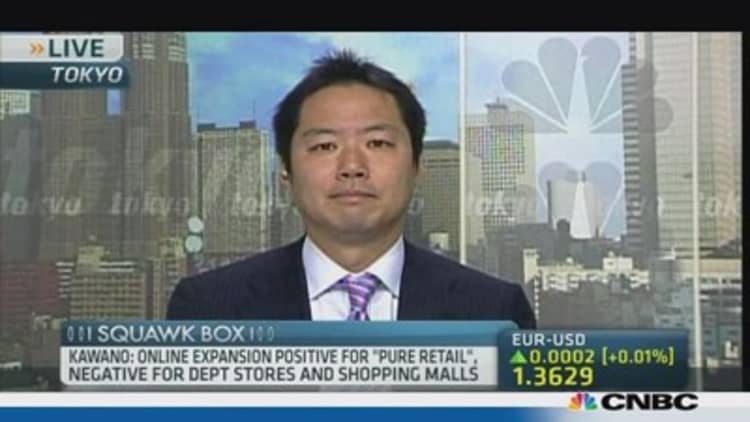The outlook for Japan, which turned a corner last year after two decades of stagnation, will become even brighter with the emergence of a "wage surprise," according to Prime Minister Shinzo Abe.
In an editorial published on the World Economic Forum and Project Syndicate websites this week, Abe said he has come away from initial meetings between the government, business and labor leaders on a strategy where wage growth leads to stronger economic growth with confidence.
(Read more: Is the honeymoonover for Japan equities?)
Japan, the world's third biggest economy, has been defined over the past two decades by deflation and poor economic growth.
Its prospects improved last year thanks to aggressive fiscal and monetary stimulus. To lift long-term growth prospects, Tokyo needs to deliver sustained wage growth to put deflation firmly in the past and implement structural reforms, economists say.
(Read more: Business sentiment in Japan hits a 6-year high)
"Let's face it. Deflationary pressure in Japan – and only in Japan – has persisted for well over a decade…. I launched what observers have called 'Abenomics,' because only in my country had the nominal wage level remained in negative territory for a staggering length of time," Abe said.
"Japan's wage earners have lost 34.3 trillion yen ($324 billion) over the last decade and a half – an amount larger than the annual GDP (gross domestic product) of Denmark, Malaysia, or Singapore. Only when this trend is reversed can Japan's economy resume a long-term upward trajectory," he added.
Abe said Japan is now seeing the emergence of a new consensus that the government, business and labor groups should work together to lift wages and bonuses.
(Read more: Japan's tax hike won't hit all retailers equally)

"Needless to say, wage levels ought to be determined solely by management and workers. But it is equally true that the emerging consensus among the government, business leaders, and trade unions already has led a growing number of companies to promise significantly higher wages and bonuses," he wrote.
"This is the essence of the wage surprise. It will be an entirely new phenomenon, one that, together with the massive 5 trillion yen fiscal stimulus, will more than offset the potential negative effect of a sales-tax increase," he added, referring to a rise in Japan's consumption tax that takes place in April.
Optimism about Abe's economic policies and a weak yen helped fuel a stellar 57 percent gain in the stock index last year, while the closely-watched Tankan survey showed business sentiment hit a six-year high in the three months to December.
(Read more: Nikkei at 25,000? Nomura thinks so)
"Some say that, unlike the first and second arrows, the third is hard to come by. I do not disagree: by definition, structural reforms take more time than changes in monetary and fiscal policy do," Abe said, adding that the government was committed to delivering an economic recovery by "all means available."
"Here, the wage surprise stands out, because only when the long-missing link between corporate profitability and wages is restored will investment in houses, cars, and other durables, and household consumption in general, finally rid Japan of its deflation and put its economy on a sustained growth path," Abe said.
— By CNBC.Com's Dhara Ranasinghe; Follow her on Twitter @DharaCNBC


